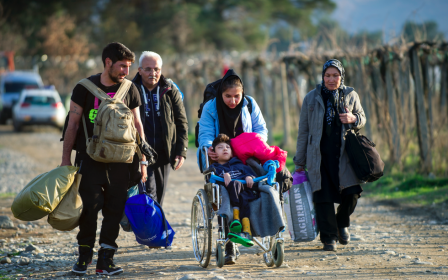Merkel: EU can't let Greece fall into 'chaos' in refugee crisis

German Chancellor Angela Merkel said Sunday that the EU can’t allow Greece, a country recently bailed out from a debt crisis, to plunge into "chaos" by shutting European borders to refugees.
"Do you seriously believe that all the euro states that last year fought all the way to keep Greece in the eurozone -- and we were the strictest -- can one year later allow Greece to, in a way, plunge into chaos?" Merkel said in a TV interview.
With divisions widening before an emergency EU summit to discuss the crisis on 7 March, anger is mounting, with Berlin enraged at the way Balkan nations led by Austria have closed the refugee transit route, the Guardian reported.
Merkel criticised Austria and the Balkan countries for introducing border controls or capping daily migrant arrivals, creating a bottleneck in Greece as refugee boats continue to arrive from Turkey.
Germany’s hardline finance minister, Wolfgang Schäuble, hinted that Europe’s powerhouse might be willing to cut Greece some slack as it struggles with the dual task of dealing with the refugee crisis and enacting punishing reforms, according to the Guardian.
At an economic forum in Delphi, Berlin’s ambassador to Athens, Peter Schoof, said: “In Germany we have taken the decision that we have to support Greece,” the Guardian said.
"What has happened is exactly what we feared, that a country is now left alone with its problems, and we can't allow that," Merkel said in a lengthy interview on the migrant crisis with public broadcaster ARD.
Merkel -- who had long sparred with Greek Prime Minister Alexis Tsipras, demanding strict austerity in return for billions in EU-IMF bailouts -- said she was now in close contact with the leftist leader on the refugee influx.
Anger has been building in Greece, the European gateway for hundreds of thousands of migrants, after Vienna introduced a daily cap on asylum applications and four Balkan countries, Macedonia, Serbia, Croatia and Slovenia, tightened entry conditions.
Germany last year took in more than a million asylum seekers, more than half from war-torn Syria, Iraq and Afghanistan, leaving Merkel exposed to rising criticism at home as well as from many EU partners.
Merkel insisted that the refugee influx be reduced through tightening EU external borders, involving NATO ships in a surveillance mission to stop refugee boats from Turkey, and an EU deal with Ankara.
"But many don't believe in this way and are saying, 'Well, who knows whether that will work?'” the chancellor said.
"If that's the way you approach a problem, then indeed it won't work out."
Merkel said of eastern European countries that have tightened their border controls: "The problem is that they acted independently and unilaterally, but it's not good if a country is not involved."
She added: "Greece was simply left on the outside. The border was secured from the Macedonian side, without anyone speaking with Greece about whether Greece wanted to secure its borders too."
Merkel said Germany's responsibility was "not to solve the problem at the expense of another country, but together with other countries. That's what we did in the euro crisis and that's what we have to do in the refugee crisis".
She insisted she remained optimistic on tackling the wider refugee crisis, and vowed -- with unusual passion -- that "it's my damn duty and obligation to do everything possible for Europe to find a united path".
Stay informed with MEE's newsletters
Sign up to get the latest alerts, insights and analysis, starting with Turkey Unpacked
Middle East Eye delivers independent and unrivalled coverage and analysis of the Middle East, North Africa and beyond. To learn more about republishing this content and the associated fees, please fill out this form. More about MEE can be found here.




